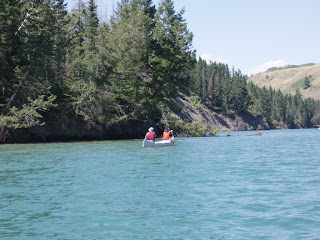Have you been looking for an excuse to get your hands dirty? If so, here it is!
In 2002, Graham Rook and Laura Brunet published an article called “Give us this day our daily germs,” in which they argued that our modern-day lifestyles in wealthy countries, including both hygiene and antibiotics, have reduced our exposure to organisms, such as mycobacteria, that live in soil and water.
This
reduced
exposure, they suggest, is improperly activating our immune systems,
resulting
in higher rates of allergies and disease. And in the past ten years,
many researchers have become interested in the ways that the human
immune system is triggered by the
world outside our bodies.
Bacteria improves quality of life in cancer patients
Of particular importance are some of the studies examining the
effects of Mycobacterium vaccae (M. vaccae)—a strain of bacteria commonly
found in soil. For example, while
testing the effects of heat-killed M. vaccae on lung cancer patients receiving chemotherapy, oncologists made an unexpected
discovery:
The bacteria did not seem to affect patients’ survival rates, but patients
did report an improved quality of
life, including better cognitive function and a sense of vitality, as well as some
relief of both the chemotherapy-related treatment symptoms and cancer symptoms.
Bacteria in soil triggers release of serotonin
Serotonin is
vital to nearly all of our physical and behavioral processes, including mood
regulation, and many common antidepressant drugs are
designed to affect serotonin levels.
Neuroscientists at the University of Bristol decided to investigate the oncologists' findings further, and discovered that heat-killed M. vaccae altered emotional behavior in mice. Specifically, the bacteria produced antidepressant-like effects by triggering neurons in the brain to produce serotonin.
Neuroscientists at the University of Bristol decided to investigate the oncologists' findings further, and discovered that heat-killed M. vaccae altered emotional behavior in mice. Specifically, the bacteria produced antidepressant-like effects by triggering neurons in the brain to produce serotonin.
Chris Lowry, lead author of the University
of Bristol study, in his conversations with the media, noted that such studies
are leading to a better understanding of the connections between healthy immune
systems and mental health. “They also leave us wondering if we shouldn’t all be
spending more time playing in the dirt,” he also said.
Which leads me to
ask:
Have you had your dose of M.
vaccae today?
Stay tuned for my next post about how regular contact with M. vaccae might also make you smarter...
References
Lowry,
C.A. et al. (2007). Identification of an
Immune-Responsive Mesolimbocortical Serotonergic System: Potential Role in
Regulation of Emotional Behavior. Neuroscience
146, 756-772.
Medical News Today. (2007, April 2) Soil Bacteria Work in
Similar Way to Antidepressants. http://www.medicalnewstoday.com/articles/66840.php
O’Brien,
M.E., et al. (2004). SRL172 (killed Mycobacterium vaccae) in addition to
standard chemotherapy improves quality of life without affecting survival, in
patients with advanced non-small-cell lung cancer: phase III results. Annals of Oncology 15(6), 906-914.
Rook, Graham and Brunet, Laura. (2002). Give us this day our daily germs. Biologist 49(4), 145-149.


